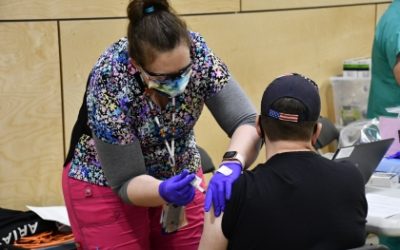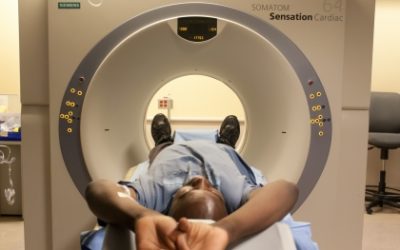Clinicians are often wary of suggesting that older patients discontinue some of their medications, believing they will get pushback.
EHR Rollout Increased Patient Error Risks, Made Staff Jobs More Difficult
Due to the sheer number of complaints received about VA’s rollout of its new electronic health record (EHR) at the Mann-Grandstaff VAMC, the VA Office of the Inspector General (OIG) initiated two separate, simultaneous inspections into the EHR process.
New Line of USP <800> Labels Can Help Assure Staff, Patient Safety
Pharmacists and other healthcare professionals understand the importance of clearly identifying medications requiring special handling, such as those covered by USP <800> and that the safety of staff and patients is at stake.
AMA-Negative Cholangitis Patients Have Similar Outcomes
Patients diagnosed with antimitochondrial antibody (AMA)-negative primary biliary cholangitis (PBC) have clinical and histopathological findings consistent with PBC but without positive AMA.
Deployment Increases Alcohol Misuse Risk Among National Guard, Reservists
Active-duty servicemembers face well known and quantified risk for alcohol misuse. Consequently, many return from combat to military bases, where they receive screening and have ready access to behavioral health.
Why Diabetes Patients With NAFLD Have Higher HCC Risk
While it is recognized that patients with nonalcoholic fatty liver disease who also have Type 2 diabetes mellitus (DM) have a high risk of progression to hepatocellular carcinoma. Exactly what causes the higher risks remain unclear, however, according to a new study.
Biomarkers Signal Risks for HCC in Cirrhosis Patients
For a patient with cirrhosis, the five-year risk of developing hepatocellular carcinoma (HCC), a highly lethal cancer with a significant increasing incidence and mortality, might be as high as 30%.
Gout Associated With Slightly Decreased Risk of Glaucoma in Veterans
How does a history of gout or arthritis due to hyperuricemia affect the development of the ocular neurodegenerative condition glaucoma?
Are DoD’s Suicide Prevention Efforts Failing? Some Legislators Think So
When it comes to suicide prevention, is the DoD putting its time and money in the right place? That was the question asked at a recent House Armed Services Military Personnel Subcommittee hearing.
In-Hospital Weight Loss Signals Improved Clinical Outcomes in HF Patients
Nearly all patients hospitalized for acute heart failure are acutely congested due to fluid retention and have gained weight by the time of their admission.
VA’s Prescribing of Direct-Acting Oral Anticoagulants Often Guideline Discordant
Since they were first approved by the Food and Drug Administration in 2010, direct-acting oral anticoagulants (DOACs) have become the most commonly-prescribed anticoagulants for nonvalvular atrial fibrillation (NVAF) due to their predictable pharmacokinetics, few drug-drug interactions and low monitoring requirements.
Severe Staffing Shortages Continue to Plague VA Healthcare System
The VA healthcare system currently is grappling with about 50,000 vacancies, mostly among doctors, nurses, social workers and physician aides. In addition, the turnover rate among nurses is the highest the department has experienced since 2005.
Veterans Receiving VA Emergency Care Have Lower 30-Day Mortality
Long-standing concerns over the difficulties navigating VA’s large and complex healthcare system and the lack of choice veterans have about where to obtain their care have led to reforms in recent years that enable veterans to opt to obtain care in the private sector.
Recovered COVID-19 Patients Have Much Greater Risk of Incident Diabetes
While it has been obvious for some time that the COVID-19 pandemic would create longer-term health effects, it is only now becoming clearer what some of those might be.
Military, Veterans More Likely to Be Screened for Many Types of Cancer
While some cancer diagnoses are disproportionately high among VA patients, the cause does not appear to be inadequate screening, according to a new study.
Biden Underscores Commitment to Veterans Who Had Toxic Exposures
During the State of the Union address, President Joe Biden shined a light, as he has many times in the past, on the effects of toxic exposure, declaring that he would continue to make it a priority of his administration.
VA Study Finds That Reduced Right Ventricular Ejection Fraction Can Affect Beta-Blocker Effectiveness in Some HFrEF Patients but Not Others
Beta blockers have been shown to improve outcomes in patients with heart failure with reduced ejection fraction (HFrEF), a complex syndrome characterized by impairment of the left ventricle resulting in a low left ventricular ejection fraction (LVEF).
Prevalence of Asymptomatic COVID-19 Might Be Lower Than Suspected
A clear definition of the frequency of asymptomatic COVID-19 infection is important for studies estimating the prevalence of SARS-CoV-2 infection, as well as for public health measures to control the spread of this virus and its variants.
New Mothers at MHS Facilities Less Likely to Use Opioids
MHS patients are less likely to fill a prescription for opioids after delivery of a child than those receiving care from civilian facilities.
Panel Recommends Closing Some VAMCs, More Emphasis on Outpatient Care
After months of anticipation and years of research, VA has released its Asset and Infrastructure Report (AIR), laying out recommendations for how VA should evolve its physical footprint in the coming decades.
Beyond SPRINT: Drug Regimen, Systolic Blood Pressure Affect CVD
The landmark Systolic Blood Pressure Intervention Trial (SPRINT) quickly changed the standard treatment of patients at high cardiovascular risk in the U.S.
VHA Offers Inconsistent Benzodiazepine Dosing for AWS
Hospitalized patients with alcohol withdrawal syndrome (AWS) —which is not uncommon—often have increased intensive care unit (ICU) and hospital lengths of stay, more hospital-acquired infections or sepsis and higher in-hospital mortality.
SUD Treatment Linked to Lower VHA COVID-19 Mortality
The risk for hospitalization from COVID-19 is elevated for patients with substance use disorders (SUD), but the link between SUDs and mortality from SARS-CoV-2 isn’t as clear.
After my experience, I have come to hate war. War settles nothing
Few figures in our collective American history have borne the scale and scope of war like our 34th president, Dwight Eisenhower. Yet, despite being one of the most successful military commanders in history as the supreme allied commander in Europe during WWII, Eisenhower does not speak of glory or fame, rather disdain for war: “War settles nothing.”
Cardiologist Brings Novel Cardiac Mapping Technology to DCVAMC
Shortly after Christmas, while the hospital was bracing for the tidal wave that would be omicron, the DCVAMC made history, becoming the first VA in the nation to use new cardiac mapping technology to perform a cardiac ablation procedure.
Monitor Cancer Survivors for Thyroid Disorders
Patients who survive cancer often face second malignant neoplasms (SMN), which are among their most serious long-term adverse health conditions.
Study Finds Disparities in VA Prostate Cancer Care
African-American men are disproportionately affected by prostate cancer, but it remains unclear whether racial and ethnic disparities occur in equal-access settings at the national level.
Opioid Safety Initiative Affected Cancer Pain Control
How has pain management for cancer patients been affected by the opioid epidemic and related risk reduction policies?
Is VA Doing Enough for Veteran Survivors Seeking Deserved Benefits?
Part of VA’s mission is to care for the widows and orphans of servicemembers and veterans, but some legislators have expressed concern that survivors are getting short shrift, especially when the veteran dies long after their initial service rather than in combat.
VA, House Committee Consider Future of Vet Center Autonomy
As VA looks at the future of its Vet Center program and whether it is meeting current demand, one of its tasks is to find the balance between keeping Vet Centers’ historic autonomy and making sure the department is providing up-to-date care, especially for veterans who are high-risk for suicide and other mental health issues.






